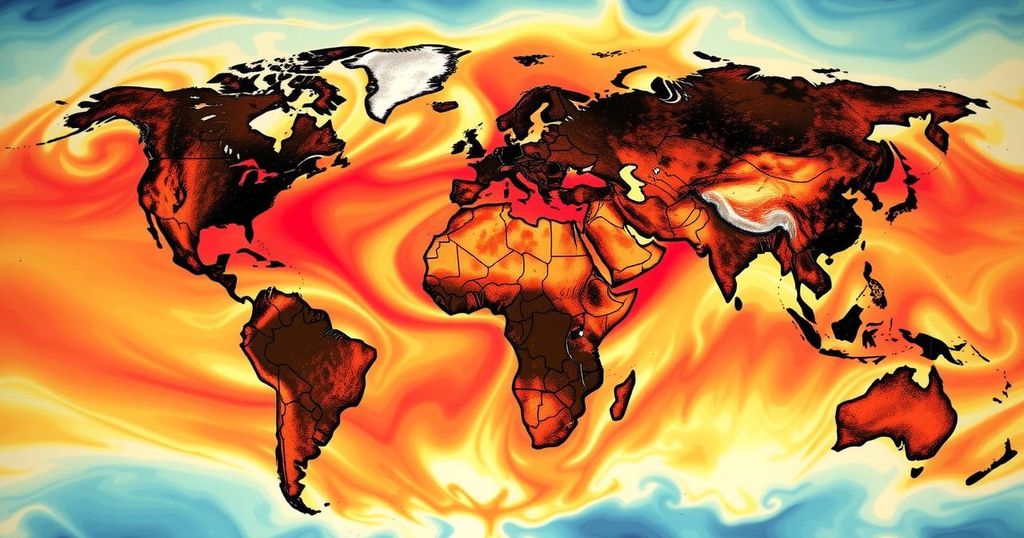The year 2024 has been recorded as the first instance of global average temperatures surpassing 1.5 degrees Celsius, as per the Copernicus Climate Change Service report. This unprecedented rise in temperature has coincided with severe extreme weather events worldwide, impacting regions with flooding, droughts, and intense heatwaves. The challenges posed by this milestone necessitate urgent action to mitigate climate change effects and safeguard vulnerable populations, reinforcing the critical targets set by the Paris Agreement.
In a significant development regarding global climate change, 2024 marks the first year on record wherein the average global temperature has surpassed 1.5 degrees Celsius above pre-industrial levels. This revelation, as highlighted by a report from the Copernicus Climate Change Service, underscores the severity of the ongoing climate crisis. Extreme weather events, including catastrophic flooding in Pakistan and Afghanistan and a historic drought affecting the Amazon river, reflect the dire consequences of this temperature rise. Notably, eleven months of 2024 witnessed temperatures exceeding the 1.5 degrees Celsius threshold, with all continents, save Australasia and Antarctica, reporting unprecedented heat levels. The overwhelming consensus among scientists emphasizes that every fraction of a degree increase contributes to devastating environmental impacts.
This alarming temperature increase is deeply intertwined with natural phenomena such as El Niño, which exacerbates climate conditions but is not solely responsible for the sustained rise in global temperatures. While individual years exceeding the 1.5 degrees Celsius mark may not signify a long-term trend, the current average of approximately 1.3 degrees Celsius remains close to this critical threshold established in the Paris Agreement. It is essential to recognize that any elevation in temperature heightens the risk of severe climatic events, including intense heatwaves and extreme precipitation, as evidenced by the heat deluge in Europe and the destructive flooding in regions like Valencia, Spain.
The ramifications of this climatic elevation are particularly dire for vulnerable populations, with poorer nations facing adverse health consequences and mortality increases. Furthermore, it is imperative to address the rising moisture content in the atmosphere, which contributes to intensified flooding and storm events. Copernicus scientists meticulously compile climate data through real-time reanalysis, integrating multiple observational sources and advanced models to present a comprehensive picture of our planet’s climatic status.
As we strive to meet the challenges presented by this urgent climate crisis, there is a pressing need for global initiatives aimed at curbing greenhouse gas emissions and developing resilient infrastructures to protect society from the extreme conditions stemming from climate change. It remains crucial to monitor the progression of these temperature anomalies as we move forward, with an eye toward the implications for 2025 and beyond. This report serves as both a record of the escalating crisis and a call to action for immediate remedial steps.
The significance of the 1.5 degrees Celsius threshold arises from the Paris Agreement, which aims to limit global warming to below this level to mitigate the effects of climate change. The Copernicus Climate Change Service employs rigorous data collection and analysis methods to monitor global temperatures and their climatic implications. Understanding the role of natural climate influencers, such as El Niño, is essential in accurately assessing temperature variations and attributing them to human activities. As the climate crisis intensifies, the need for effective strategies to combat greenhouse gas emissions and promote sustainability becomes increasingly urgent.
In summary, 2024 has been marked by unprecedented global temperatures exceeding the critical 1.5 degrees Celsius milestone, driven by both anthropogenic actions and natural climate phenomena. The ramifications of this temperature rise are evident through extreme weather occurrences worldwide, underscoring the urgent need for action and adaptation strategies. To avert further climatic deterioration and severe societal impacts, immediate and sustained efforts to reduce carbon emissions and enhance infrastructure resilience are imperative. The ongoing trend of rising temperatures serves as a stark reminder of the significant influence humanity has on the planet’s climate, necessitating decisive global collaboration.
Original Source: theprint.in






